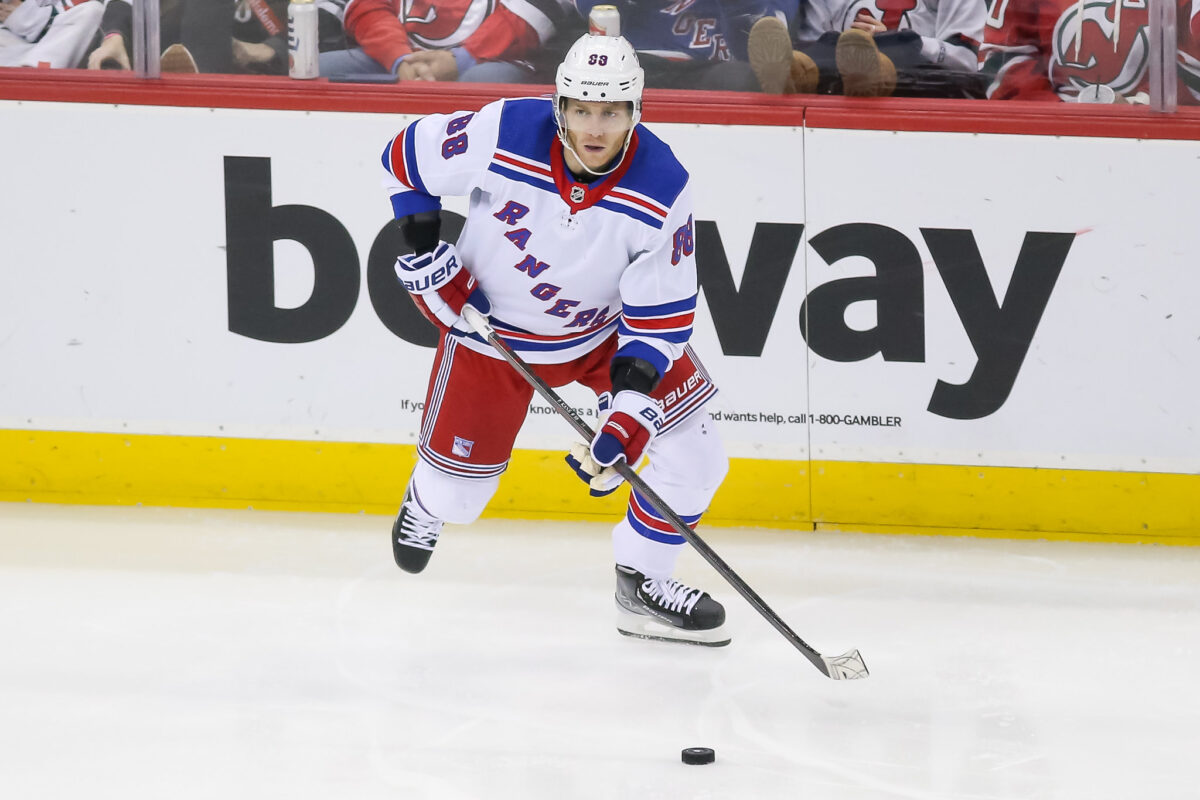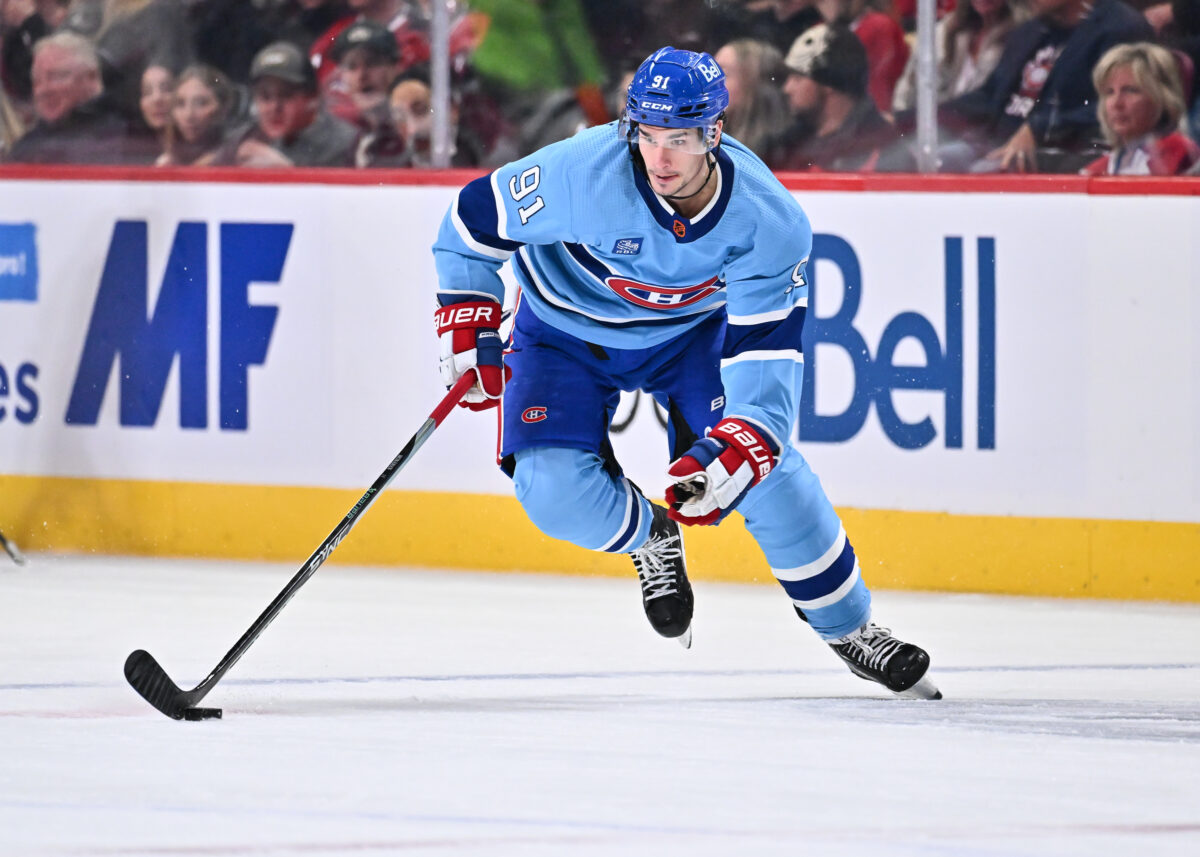The Montreal Canadiens have a long to-do list during the 2023 offseason. General manager (GM) Kent Hughes will need to focus on the NHL Entry Draft, modernize the team’s medical department, and clear salary cap space as well.
Related: Canadiens Make Changes to Modernize Medical Staff
This solidifies the fact that the timing for the Canadiens isn’t now for Hughes to add any unrestricted free agents (UFA). The team has far too many question marks and missing pieces. There are good reasons for him to avoid dipping his toe into the UFA pool altogether. There are internal solutions that can be found, which will provide opportunities for players still on the books with the Habs.
Weak Free Agent Class
The 2023 crop of UFAs has been long seen as a weak class. Frank Seravalli called it “one of the weakest overall free agent classes in more than a decade”. Even at 35 years of age, a healthy Patrick Kane, who just completed a 57 points in 73 games season as well as six points in seven playoff games for the New York Rangers, could have been an interesting addition to a contending team. However, his injury, a hip that is expected to take four to six months to heal, takes that option away.

Unlike previous UFA classes, there is no big name or star player likely to be available. Kane is injured, Patrice Bergeron and David Krejci are expected to remain Boston Bruins, and the New Jersey Devils just completed a sign-and-trade, moving Damon Severson to the Columbus Blue Jackets. All of this leaves Michael Bunting as the biggest name available. He is not “the answer” for a team on the cusp of becoming a contender. In a free agency class where a geriatric sophomore is likely to end up as the highest-paid forward this summer, it’s safe to say that this is a weak free agency class.
Canadiens Are Out of the Pool
There are two likely outcomes in an offseason with this weak of a UFA class. First, players are going to receive massive contracts that they will never be able to live up to. Second, teams will be forced to look to the trade market, which could benefit GMs like Hughes who need to offload veteran contracts.
For any team looking to add what they feel is missing on their rosters with a UFA, giving up only cap space and no assets, this isn’t exactly the best news. For the Canadiens, it removes any temptation to try and expedite the rebuild. Also, it prevents them from adding someone, presumably with a high cap hit and longer term, that could become an obstacle that impedes one of their younger players such as Juraj Slafkovsky or Kaiden Guhle from taking the next step in their development.
Canadiens Who Benefit
Beyond the younger players who will benefit from not having added obstacles to taking on larger NHL roles, there will also be an opportunity for second chances for players who are still with the organization until July 1 and disappointed either due to a dip in performance or injuries.
Denis Gurianov
The Canadiens were gambling on their new player development department to make a difference in a very short time when they acquired Denis Gurianov from the Dallas Stars. During his short time with Montreal, his points per game rate doubled from the rate he had with the Stars. However, despite the improvement offensively, he was still inconsistent from game to game. He still had issues in identifying and exploiting his shooting opportunities, as well as problems being situationally aware defensively. His best hockey was when he was paired with Josh Anderson. Having a power forward on his line allowed Gurianov to focus on his own game and not be concerned with the harder work along the boards, which is not his forte.
In Gurianov’s case, he is already guaranteed to not receive his restricted free agent qualifying offer (QO) of $2.9 million, which would make him a UFA. However, there is nothing stopping his agent from coming to an agreement on a one-year deal at $1 million or less with Hughes. Without any better options in the UFA market, Gurianov could benefit from a second chance in Montreal.
Sean Monahan
Sean Monahan’s injury history began during the 2020-21 season. He had the worst performance of his career, putting up only 28 points in 50 games. Soon after, he required multiple hip surgeries, limiting his effectiveness, and making the final year of his $6.375 million salary an anchor for the Calgary Flames, and blocking their attempts to sign then-UFA Nazem Kadri. Hughes leveraged his cap space to take on Monahan’s salary in return for Calgary sending a first-round pick with Monahan in the deal for future considerations.

As soon as he arrived, Monahan became an invaluable addition on and off the ice for the Canadiens, scoring six goals and 17 points in 25 games. His presence meant that Nick Suzuki wasn’t being relied upon to do all of the work as the only top-six capable center. He took some special teams’ time and also forced opposing teams to spread their defensive schemes across two lines instead of just one. Unfortunately, he ran into significant injury troubles by the month of December, admitting to playing on a broken foot during the Canadiens’ western road trip.
Letting Monahan walk via unrestricted free agency is a good option salary cap-wise. It would open up a roster spot that could be filled by a younger player or graduating prospect. But the Canadiens would lose the leadership and experience a veteran like Monahan provides, and that is still a useful tool during a rebuild.
The value of holding onto Monahan, who can provide all of that, is worth a one-year deal. If Hughes could convince him to stay at a reasonable contract value, somewhere in the $1 to $2 million range, it could give the Habs a player to guide the youth until the 2024 Trade Deadline, where he could then trade for another significant asset, that is if Monahan can remain healthy.
A weak UFA class in the end plays exactly into what the Canadiens and its GM need. A class that will not tempt Hughes to try and speed up the process, but also force other GMs to look at the trade market, which can benefit Montreal in the short term. For the soon-to-be UFAs or RFAs on the Habs’ roster, it provides them a chance to sign a team-friendly, short-term deal that can allow them more time to prove they deserve larger and longer-term deals in the future.
